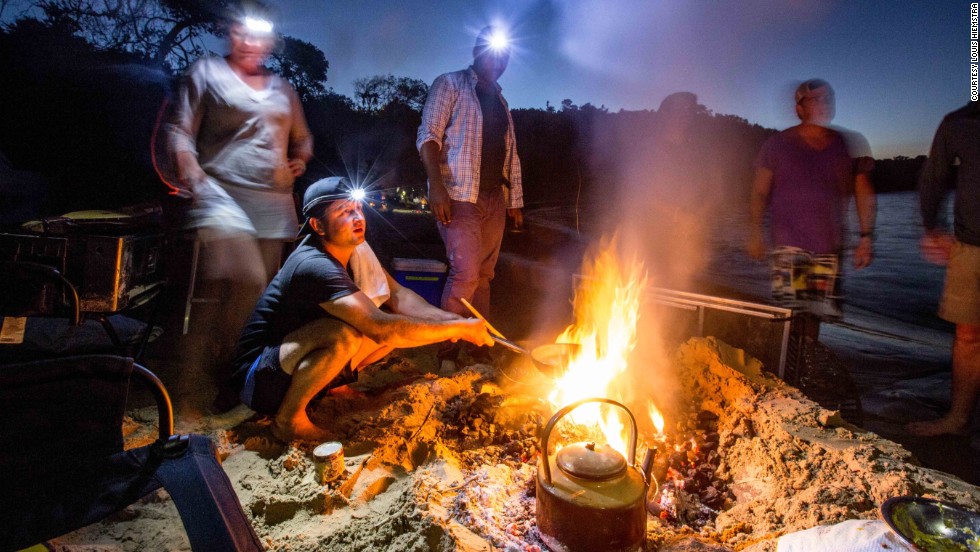In Africa, people view life much differently. They see time as much longer and more gradual. Africans recognize the important fact that the Earth is ancient and our time on this planet is short. As such, we should not fret about much as it does not really matter in the long run. We will all soon be gone. Keeping that in mind, what we value in America is then rather trivial, money that is. Once you realize that it is a man-made artificial construction that’s only valuable because everyone else values it, money becomes inconsequential at a bird’s eye view. The idea that everyone should reach for the nice car, house, or trophy wife is then found to actually be full of hot air.
Further, I found this to put even more into perspective at a visit to one of Johannesburg’s most popular sites, the Apartheid Museum. There, they currently have an exhibit dedicated to Nelson Mandela. In his twenty seven years in prison, he had the poem Invictus to guide him in his darkest times. The last paragraph is this: “it matters not how strait the gait, how charged with punishments the scroll, I am the master of my fate, I am the captain of my soul.” If Nelson Mandela could find the courage to keep moving forward in spite of the callousness of the damp and empty prison walls, we should all be able to do in like manner in our safe, air conditioned homes. Even if there is turbulence and chaos around you and unless you are dead, you will always be able to control yourself. Africans realize this. They accept that we cannot control 90-95% of what happens in the world, but we can control ourselves. There will always be the constant of your person.
On a lighter note, one of the coolest things that they did in South Africa was “Braai.” The American equivalent would be a BBQ, but it is much more delicious than any American BBQ I have ever been to. First off, they do not use any gas, only charcoal or wood as gas would ruin the flavor of the meat and give it a propane taste. The fuel has to be high repute. It cannot be Kingsford or any other cheap brand; we’re aiming for quality, not quantity. You take your time with it. While you cook, drink a beer. Take notice of the world around you while you sip it and turn your meat. Converse as you do so; it’s good for the digestion. There’s no rush. The end goal is to create a master piece and have a good meal with good beer with good friends. Meat is cooked this way for two reasons. First, this is the best way to cook meat. It results in a delicious meal. Second, life is short. It would be senseless to cook and eat it in a way that does not result in as much enjoyment as possible. South Africans come to a different conclusion about what we should do about the shortness of life. According to them, we should use our time to enjoy it just like this Braai.

Unfortunately, Americans come to a different conclusion about the shortness of time. It has to be used making money. One of our most common phrases is, “time is money.” Yes, while that is the case, would it not be better spent in company of others? It is, after all, more rewarding to the soul than to the bank account. “No,” Americans are told. The best way to measure one’s self is with money. It is very straight forward. Increasing money means for increasing worth of person. But how can one use an artificial construction of money to qualify something as abstract as the worth of a person’s life? It is a false comparison. Americans have incorrectly conflated a person’s worth with one’s wealth.
One of the coolest experiences I had was by chance encounter in Johannesburg. On August 19, I visited the SAB World of Beer in Jozi (a common nickname for Johannesburg). While there, I learned about the history of beer, how it raised the Egyptian civilization, beer’s prevalence in the medieval world, to shebeens that served as underground bars during Apartheid, eventually leading all the way to the present day. I tasted chibuku, a traditional African beer. They walked me through the basic ingredients of beer, barley and hops. At the end of it all, I got two free coupons for drinks afterwards. While drinking, I ended up meeting two people, Craig and Ricardo. We talked and they told me that more of their friends would be showing up. Ricardo eventually invited me to join them for dinner and drinks at his house.
At Ricardo’s house, I had drinks, appetizers, and conversation to hold me over until dinner. One of the discussions I had with them was about race. South Africans view race in a much different way than Americans do. Under Apartheid, there were three racial classifications one could receive according to the law: white, colored, or African. Whites fared the best, colors less so. Africans were the worst off. One’s class affected a person’s entire life, from standard of living to taxes and from employment to education. The people I was hanging out with were considered colored. Ricardo jokingly called his race rape babies (white men have historically raped Black women, leading to mixed offspring). Even though they consider themselves colored, in the US they would be seen as Hispanic or even African-American despite their different class in South Africa. It’s a funny thing, race. When a person meets someone new, they instantly start constructing a background for that person before even talking to them. They assume before anything else that person’s character even though it has been consistently proven that one cannot know another’s life story by simply looking at someone and drawing conclusions from there.